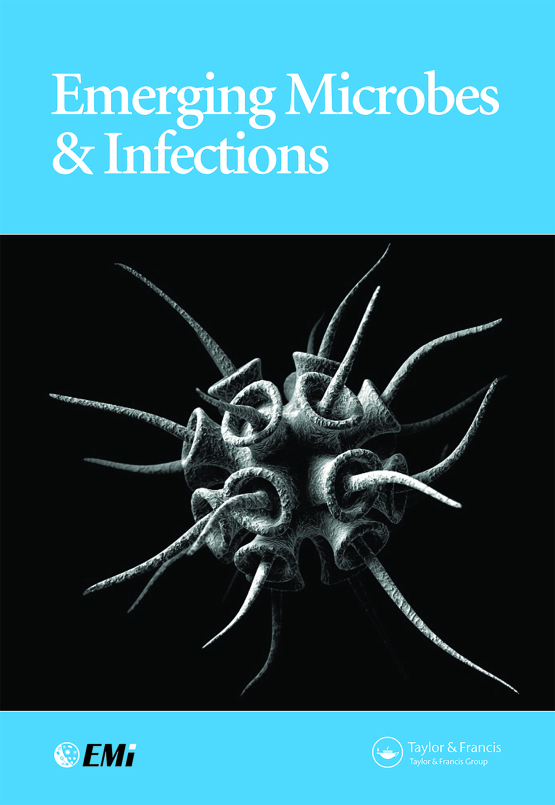Submit a Manuscript to the Journal
Emerging Microbes & Infections
For an Article Collection on
Utilizing Genomics and Molecular Epidemiology to Unravel the Evolution and Transmission
Manuscript deadline
31 July 2024


Article collection guest advisor(s)
Prof. Yuelong Shu,
National Institute of Pathogen Biology, CAMS&PUMC, China
Prof. Mang Shi,
Sun Yat-sen University, China
Prof. Henry Wan,
University of Missouri-Columbia. USA
Utilizing Genomics and Molecular Epidemiology to Unravel the Evolution and Transmission
Molecular epidemiology integrates traditional epidemiological approaches with molecular biology techniques to investigate the emergence, distribution, and dynamics of diseases within populations, while also identifying associated risk factors. For example, during an outbreak, molecular epidemiology can correlate pathogen genomes with host information, such as basic demographics and clinical information, to identify sources of infection, track the spread of disease, and assess the risk and benefit for targeted disease interventions. Molecular epidemiology has been a powerful tool used in the surveillance of infectious diseases, providing crucial information for effective outbreak response.
The past decade's advancements in genomic sequencing techniques have made genomic data an integral and routine tool in disease diagnosis, surveillance, and research. As a result, the abundance of genomic data related to various diseases offers significant potential for advancing the field of molecular epidemiology. Publicly accessible, open-access databases like the Global Initiative on Sharing All Influenza Data (GISAID) are specifically designed to integrate genomic data with host and environmental information associated with pathogens. These centralized data repositories now facilitate the application of advanced computational technologies, such as machine learning and AI, in molecular epidemiology, allowing us to address questions that were previously beyond our reach.
This Article Collection seeks to invite contributions and submissions of research articles that investigate emerging microbes through molecular epidemiology, with a particular emphasis on genomic approaches. This includes, but is not limited to:
- Emergence, evolution, and/or transmission dynamics of emerging microbes
- Novel approaches, including machine learning/AI, and their applications in advancing molecular epidemiology, particularly for analyzing large-scale data analyses to promote surveillance, risk assessment, and control of emerging infectious diseases
- Development and/or application of molecular epidemiology in disease diagnosis, vaccine development, therapeutic treatment, or disease management
Keywords: emerging microbes, molecular epidemiology, pathogen genomics, pathogen discovery, machine learning/AI, evolution
Guest Advisors
Yuelong Shu, Ph.D. is a Professor at the National Institute of Pathogen Biology, CAMS&PUMC, China. Dr. Shu’s research team focuses on the molecular evolution, interspecies transmission, and pathogenic mechanism of influenza viruses, developing next-generation vaccines for influenza prevention and control. He played a leadership to establish the national influenza surveillance network in China, which is the biggest influenza network in the world including 408 influenza laboratories and 554 influenza sentinel hospitals. He also led the CNIC to be designated as the first WHOCC in developing countries by WHO in 2010. He has published 100+ peer-reviewed scientific journal papers including in Science, Nature, NEJM, Lancet et al. Notably, he identified novel avian H7N9 and H10N8 influenza viruses, which caused severe human infections in China, raising significant global public health concerns.
Mang Shi, Ph.D. is a Professor at the Sun Yat-sen University. Dr. Shi’s research team uses cutting-edge genomics tools, bioinformatics pipelines, and machine learning algorithms to discover pathogens and characterize their evolutionary, ecological, and host dynamics. For further details about Prof Mang Shi's professional profile, kindly refer to the link: https://szmed.sysu.edu.cn/teacher/1206
Henry Wan, Ph.D. is a Curators’ Distinguished Professor and a Director of NextGen Center for Influenza and Emerging Infectious Diseases at the University of Missouri-Columbia, USA. Dr. Wan's research focuses on two areas: understanding the transmission of zoonotic pathogens, particularly influenza and coronaviruses, and enhancing vaccine effectiveness through the integration of laboratory, clinical, and computational methods. For further details about Prof Henry Wan's professional profile, kindly refer to the link: https://medicine.missouri.edu/faculty/xiu-feng-henry-wan-phd
Disclosure Statement: All guest advisors have no conflicts of interest to disclose.
All manuscripts submitted to this Article Collection will undergo a full peer-review; the Guest Advisor for this Collection will not be handling the manuscripts (unless they are an Editorial Board member).
Please review the journal scope and author submission instructions prior to submitting a manuscript.
The deadline for submitting manuscripts is July 31st, 2024.
Please contact Ruby Ru at [email protected] with any queries and discount codes regarding this Article Collection.
To submit your papers to this Article Collection, please:
- Check "yes" for the question, "Are you submitting your paper for a specific special issue or article collection?"
- Select the relevant Article Collection from the drop-down menu under the question, "Special Issue or Article Collection Name."
Benefits of publishing open access within Taylor & Francis
Global marketing and publicity, ensuring your research reaches the people you want it to.
Article Collections bring together the latest research on hot topics from influential researchers across the globe.
Rigorous peer review for every open access article.
Rapid online publication allowing you to share your work quickly.
Looking to Publish your Research?
Find out how to publish your research open access with Taylor & Francis Group.
Choose open accessSubmission Instructions
All manuscripts submitted to this Article Collection will undergo desk assessment and peer-review as part of our standard editorial process. Guest Advisors for this collection will not be involved in peer-reviewing manuscripts unless they are an existing member of the Editorial Board. Please review the journal Aims and Scope and author submission instructions prior to submitting a manuscript.